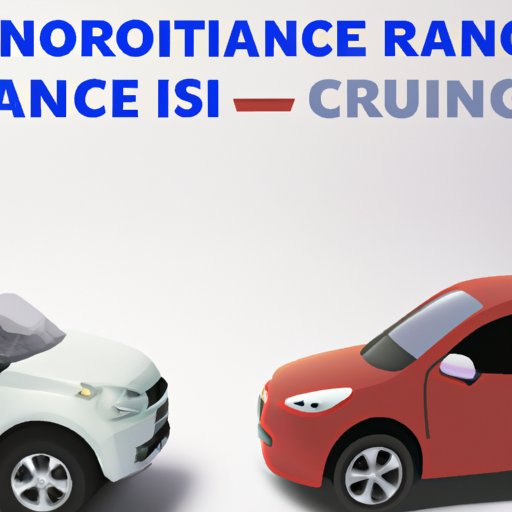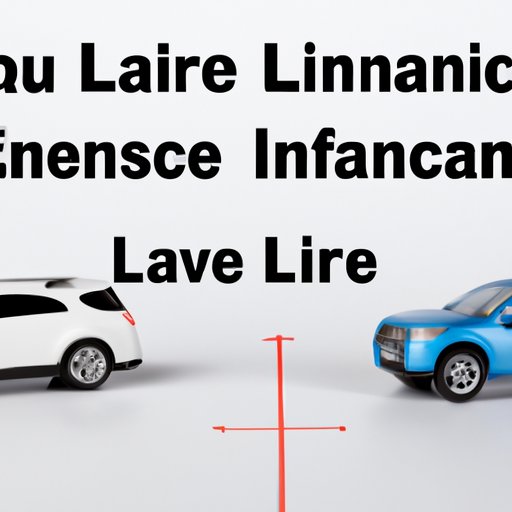Introduction
Full coverage car insurance is a type of policy that provides protection against damages caused by an accident, theft, or other events. It typically includes both liability and collision coverage, which helps protect you from financial losses if you’re found at fault for an accident or your vehicle is damaged. But when it comes to financing a car, do you need full coverage?
In this article, we’ll explore the pros and cons of having full coverage when financing a vehicle. We’ll discuss how to decide if you need full coverage and what factors to consider when choosing a policy. We’ll also compare the costs of full coverage vs liability insurance when financing a car, as well as the benefits of having full coverage. Finally, we’ll look at what to keep in mind when purchasing full coverage for your financed vehicle.

Exploring the Pros and Cons of Full Coverage Car Insurance When Financing a Vehicle
Before deciding if you need full coverage when financing a car, it’s important to understand the pros and cons of having this type of policy. Here are some of the main advantages and disadvantages associated with full coverage car insurance:
Advantages of Having Full Coverage
One of the biggest advantages of having full coverage car insurance is that it can help protect you financially in the event of an accident. If you’re found at fault for an accident, your policy could cover the costs of repairs or medical bills. Additionally, full coverage can provide protection against damage from natural disasters or theft. So if your car is damaged due to a hurricane, flood, or fire, or stolen, your insurer could help cover the cost of repairs or replacement.

Disadvantages of Having Full Coverage
The downside of having full coverage car insurance is that it can be more expensive than liability insurance. Additionally, some insurers may require you to have a higher deductible when purchasing full coverage. This means that you’ll have to pay more out of pocket before your insurer covers the rest of the costs.
How to Decide Whether You Need Full Coverage When Financing a Car
When deciding if you need full coverage when financing a car, there are several factors to consider. For example, the age and value of the car you’re financing will play a role in determining how much coverage you need. Generally speaking, newer cars with higher values require more coverage than older cars with lower values.
Another factor to consider is whether you need full coverage or just liability insurance. Liability insurance only covers damages to other people and property, not your own car. So if you’re financing an older car with a lower value, you may not need full coverage. However, if you’re financing a newer car with a higher value, it’s usually a good idea to get full coverage.

What Factors to Consider When Choosing Full Coverage for Financed Cars
When choosing full coverage for a financed car, there are several factors to consider. One of the most important is the deductible amount. A deductible is the amount of money you’ll have to pay out of pocket before your insurer will cover the rest of the costs. The higher the deductible, the lower your premiums will be. But keep in mind that if you choose a higher deductible, you’ll have to pay more out of pocket in the event of an accident.
You should also consider the types of coverage included in your policy. Most full coverage policies include both collision and comprehensive coverage. Collision coverage provides protection against damages caused by an accident. Comprehensive coverage covers damages from events such as theft, vandalism, and natural disasters.

Comparing Costs of Full Coverage vs Liability Insurance When Financing a Vehicle
When it comes to the costs of full coverage vs liability insurance when financing a vehicle, there are some key differences to consider. Generally speaking, full coverage tends to be more expensive than liability insurance. This is because full coverage provides more protection than liability insurance. However, the exact cost of full coverage will depend on factors such as the age and value of the car, the deductible amount, and the type of coverage included in the policy.
It’s also important to shop around and compare rates from different insurers. This will help you find the best deal on full coverage car insurance when financing a vehicle.
What Are the Benefits of Having Full Coverage When Financing a Car?
Having full coverage when financing a car can provide several benefits. First and foremost, it can provide financial protection in the event of an accident. If you’re found at fault for an accident, your policy could cover the costs of repairs or medical bills. Additionally, full coverage can provide protection against theft, vandalism, and natural disasters. So if your car is damaged due to a hurricane, flood, or fire, or stolen, your insurer could help cover the cost of repairs or replacement.
Finally, having full coverage when financing a car can give you peace of mind knowing your vehicle is covered. This can be especially important when financing a newer car with a higher value.
What Should You Keep in Mind When Purchasing Full Coverage for Your Financed Car?
When purchasing full coverage for your financed car, there are a few things to keep in mind. First, make sure you understand the different terms and conditions of the policy. This includes reading the fine print to understand what’s covered and what’s not. Additionally, make sure you understand the deductible amounts and types of coverage included in the policy.
It’s also important to shop around and compare rates from different insurers. This will help you find the best deal on full coverage car insurance when financing a vehicle.
Understanding the Necessity of Full Coverage When Financing a Vehicle
In most cases, lenders will require you to have full coverage when financing a vehicle. This is because they want to ensure their investment is protected in the event of an accident or other event. However, in some cases, lenders may allow you to purchase liability insurance instead. So it’s important to check with your lender to see what type of insurance they require.
It’s also important to remember that even if your lender doesn’t require full coverage, it may still be a good idea to purchase it. This is because full coverage can provide more protection than liability insurance in the event of an accident or other event.
Conclusion
Deciding whether or not you need full coverage when financing a car can be tricky. On one hand, full coverage can provide more protection than liability insurance in the event of an accident or other event. On the other hand, it can be more expensive than liability insurance. Ultimately, the decision of whether or not to purchase full coverage when financing a car will depend on factors such as the age and value of the car, the deductible amount, and the type of coverage included in the policy.
By understanding the pros and cons of full coverage car insurance, as well as what factors to consider when purchasing it, you can make an informed decision about whether or not to purchase full coverage when financing a vehicle.
(Note: Is this article not meeting your expectations? Do you have knowledge or insights to share? Unlock new opportunities and expand your reach by joining our authors team. Click Registration to join us and share your expertise with our readers.)
